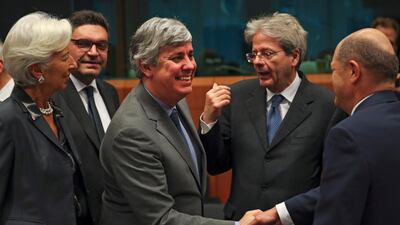A €540 billion bailout fund agreed by the EU’s finance ministers in response to the Covid-19 crisis has received a mixed reaction from officials across the continent.
After several failed attempts, the Eurogroup of EU finance ministers on Thursday agreed an unprecedented economic package to support member states, companies and workers during the coronavirus pandemic.
Under the plan, the Luxembourg-based European Safety Mechanism will provide loans for states, the European Investment Bank will provide company loans and workers will be provided loans via SURE, the European Commission’s new financial instrument.
“This response contains bold and ambitious proposals that would have been unthinkable just a few weeks ago,” said Mario Centeno, the Portugal’s finance minister and Eurogroup chairman.
“What matters the most is that we rose to the challenge – our citizens expect and deserve nothing else,” he said after the meeting.
“With this package we will help countries in need in the short term while also building resilient economies in the long-term. This is a powerful and sensible sign of European solidarity,” Dutch finance minister Wopke Hoekstra said.
His French counterpart Bruno Le Maire praised the agreement as the most important plan in economic history.
"Europe has decided and is ready to meet the gravity of the crisis," he tweeted after the talks.
Others were more critical of the bailout package.
Greek leader of the opposition Alexis Tsipras described it as “inferior to the circumstances”.
“The €540 billion to deal with the crisis is a package far short of the real need for immediate support for the European economy,” he said on Twitter.
“Yesterday, a great opportunity was lost for decisions that would pave the way in the hope of rebuilding the EU's cohesion, for a strong shield against the crisis. The decision leaves the window wide open for a new debt crisis in the Eurozone.”
Italy’s eurosceptic League party leader Matteo Salvini criticised the bailout deal, saying that the ECB was “the only European institution that works” as it has already guaranteed to buy another €200 billion of Italian bonds by the end of the year.
He said domestic bonds to help the economy recover from the pandemic would offer more tax advantages to Italians than EU bonds.
“I think that many Italians would be willing to bet on Italy, rather than waiting for the German or French multinational to arrive,” he added.
Marathon talks with Eurogroup ministers fell apart after a 16-hour conference call on Wednesday as Italy and Netherlands were at loggerheads over how to design loans for the ESM.
Roberto Gualtieri, Italy's finance minister, said that ESM loans should come with no guarantee from countries receiving the money to carry out economic reforms in the future. But the Dutch finance minister, Mr Hoekstra, disagreed, and urged for tougher conditions to be attached to credit lines.
Italy has also been supportive of so-called “corona bonds” – shared debt that all EU nations would have to pay off. The Netherlands led opposition to the idea.
The coronavirus has infected more 1.6 million people globally and killed over 96,000. Around 361,000 people are known to have recovered.

